The Vizier in Ancient Egypt
Second in authority only to the pharaoh, the office of vizier in ancient Egypt was a highly coveted position that existed at the very beginning of the Pharaonic period. Usually, this non-royal but prestigious position was bestowed upon a trusted family member in whom the pharaoh had great confidence.
Female Viziers
Most often, the position was bestowed upon a male but a record of two female viziers have survived, Nebet in the Sixth Dynasty of the Old Kingdom, and one in the 26th Dynasty. Evidently, Nebet held the title of vizier but her husband performed the duties of the office.
Installation of the Vizier
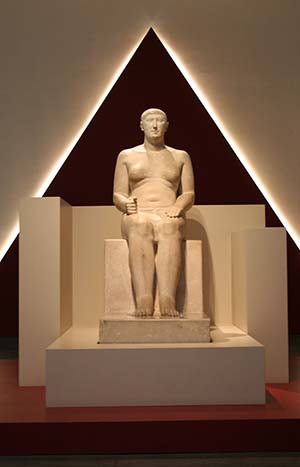
© Einsamer Schütze - Statue of Vizier Hemiunu
An ancient Egyptian text entitled the “Installation of the Vizier” was found in the tomb of the vizier Rekhmire and entails the duties of his office, including:
- The code of conduct
- The appointment
- Relationships and interfaces with other officials
Two similar texts exist, but they are incomplete; Rekhmire's transcript is the only complete description of the functions of this exalted office. Rekhmire's main duties involved overseeing the departments of:
- Agricultural
- Executive
- Interior
- Judicial
- Treasury
- War
- Religious
Among these general duties, were the specific duties of sitting in the high court, recording trade, and acting as the pharaoh's seal bearer.
The vizier was also responsible for selecting all major high religious positions in the country, including the high priest at Memphis. He oversaw the form and performance of all major religious rituals, festivals, and other events. In some rare instances, the vizier was a priest himself and assumed the high priesthood or another religious office.
Duties of a Vizier
The vizier's responsibilities were incredibly diverse, ranging from direct tasks for the pharaoh to the most mundane of daily assignments. Such duties included
- Organizing, verifying, and consulting criminal registries
- Building and maintaining guard posts
- Selecting police overseers
- Interviewing and selecting the pharaoh's escort and guards
- Selecting and receiving reports from magistrates
- Organizing the building and repair of dams, dykes, and canals
- Overseeing and often designing the construction of temples, monuments, and tombs
The vizier was even in charge of sending workers to cut down trees. His responsibility was not solely to the pharaoh, but to the Egyptian people as a whole. The Duties states bluntly that "every plea should be reported to him." Any petition or appeal of a complicated court case was heard by the vizier, and he was the ultimate judge in these matters.
Ancient Egyptian viziers, because of their power, were expected to be law-abiding, impartial, and levelheaded. When a pharaoh was very young or was weak or otherwise incapacitated, it was the vizier who cohesively held the country together. Often, a vizier would maintain his office during the reign of several pharaohs, unless a pharaoh wanted to appoint his own vizier rather than use that of his predecessor.
Hieroglyphs often depict the viziers wearing long, white robes; these symbolized their purity of heart and spirit. A vizier in ancient Egypt did not generally attempt to supplant the pharaoh, due either to the vizier's code of ethics or the realization that it could endanger the balance of power that existed within the government.
The chief differences between the vizier and the pharaoh were that the pharaoh was more powerful and considered divine, while the vizier was chief among civil servants in the land.
Responsibilities of the Vizier
The vizier was administratively responsible for the day to day function of the kingdom, as well as overseeing special tasks and events. Although testing the water supply may seem mundane by today's standards, uncontaminated water was essential for the civilization to function. It was perhaps more important than today because the ancient Egyptians lacked an alternate water supply, so ensuring the potability of the water supply was one of the vizier's duties.
Central to the vizier's roles was the maintaining and elevating what the Egyptian's called ma'at, a multifaceted concept involving balance, harmony, and justice. This was not solely a civic or government matter. It was also of deep religious importance to the Egyptians. There was a goddess named Ma'at, but the concept in general was represented by a feather.
To pass into a happy afterlife, a person's heart was measured. If it was equal in weight to the feather, then the spirit of the person could proceed. In a more general sense, ma'at was also the prosperity and peace of the country. The vizier was seen as the chief officer in charge of Egypt's ma'at, working on behalf of the pharaoh to increase it in the name of the gods.
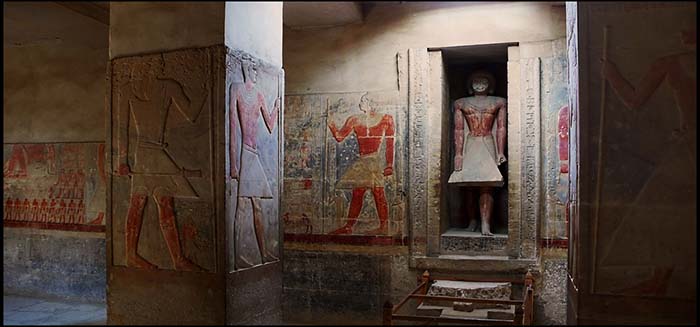
© Guillén Pérez - Tomb of Vizier Mereruka
All court officials reported to the vizier, including supervisors, tax collectors, scribes, and so forth. The vizier was responsible for checking the various treasuries for problems or discrepancies and inquiring of the pharaoh's condition on a daily basis. In essence, the vizier was the overseer of all matters of daily life, from maintaining civil order to ensuring that the pharaoh was well.
n addition to this broad range of tasks, the vizier also functioned as a personal assistant to the king. All government documents had to have the vizier's seal on them in order to be considered official.
Specifics of the vizier's duties prior to the New Kingdom period are not known because no text on the subject from that era survives. However, the Duties may have been drawn from a far older text, but this cannot be definitively known.
Among the most important responsibilities of the vizier was his employment as an appellate judge in civil and criminal matters. This ranged from land disputes and inheritance rights to criminal prosecution and sentencing. The vizier had special offices in a facility called the Great Prison, where he had access to the criminal registry, land records, and past court cases. This location was also convenient in criminal trials; if a person was found guilty, there would be no need to transport them to another facility for imprisonment.
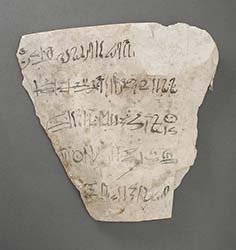
© Ashley Van Haeften - Letter to a Vizier
Evolution of the Vizier in Ancient Egypt
From the time of the position's creation (sometime after 3150 BC) to the Twelfth Dynasty, most or all viziers were close relatives of the king. Eventually, the vizier became a hereditary position. Vizier was a lifelong appointment, and one vizier often served several pharaohs, keeping the kingdom stable and organized until the next king rose to power. And as time passed, the vizier's power as chief administrator of the kingdom only got stronger. This continued to be true into the New Kingdom, when the position of vizier ceased to be hereditary.
By the 18th Dynasty, the vizier position had been divided in two, with one administering the Upper Kingdom and another administering the Lower Kingdom. This not only ensured the smooth administration of the growing Egyptian kingdom. It also helped guarantee no vizier could become more powerful than the pharaohs themselves. The Upper Kingdom vizier was based in Thebes while the Lower Kingdom counterpart was based in Memphis.
By the 8th century BC, the figure of the vizier had weakened significantly. However, he still took on a largely ceremonial role. While scholars are not certain of the reasons for this reduction in power, it appears to have been caused in part by Egypt's interactions with other cultures, including the Phoenicians, Canaanites, Mesopotamians, and Nubians.
The Transfer of Power
Vizier
When a vizier died during the reign of a pharaoh, a new vizier would be chosen immediately. In the earlier periods, the selected person would be another family member of the pharaoh. In later times, the new vizier would either be a son or other family member of the last vizier, or one of the higher ranking scribes from the former vizier's staff.
Pharaoh
When a pharaoh died, that vizier would often continue in his role during the reign of the next pharaoh. However, this was not set in stone, as a new vizier could be chosen anytime at the pharaoh's discretion.
Most Important Viziers
-
Imhotep
There have been many famous viziers in history, but perhaps the most famous is Imhotep of the Third Dynasty. Not only was he chancellor to the pharaoh, he was high priest at Heliopolis, an engineer, a physician, and an architect. He was also an exalted philosopher who was posthumously given divine status and has been called the real father of medicine.
Imhotep's complete list of titles was:
- Chancellor of the King of Egypt
- First in Line After the King of Upper Egypt
- Doctor
- Hereditary Nobleman
- Administrator of the Great Palace
- Chief Carpenter
- Chief Sculptor
- Builder
- Maker of Vases in Chief
Click here to learn more about Imhotep...
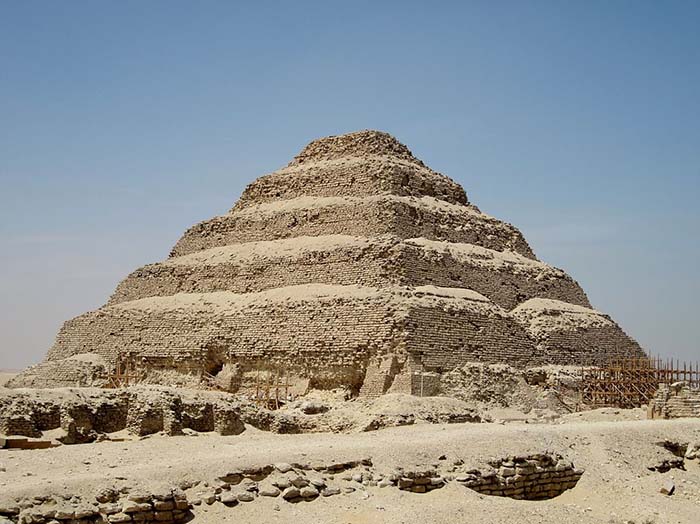
© Olaf Tausch - The Step Pyramid, designed by Imhotep
-
Rekhmire
Serving Thutmose III during the 18th Dynasty, from 1479 to 1425B.C., Rekhmire achieved fame in part because of his tomb, which contains detailed depictions of daily life in the New Kingdom. His tomb also contains his text “The Installation of the Vizier”, which provides insight into the full duties and responsibilities of a vizier and is the only such script known to exist.
Rekhmire served the pharaohs for more than 50 years, but appears to have fallen into the pharaoh's disfavor when Rekhmire was about 70 years old.
Some scholars speculate that Rekhmire was the pharaoh with whom the Israelites dealt at the time of the great plagues in Egypt; he was in command at that time because the pharaoh was away campaigning. Some stories say he released the Israelites. When the pharaoh learned of this, he was exceedingly displeased, thus Rekhmire's fall from the pharaoh's favor.
-
Ankhu
The son of a vizier, Ankhu served King Sobekhotep II and King Khendjer during the 13th Dynasty. He's thought to have been approximately 55 years old when serving under King Khendjer. Speculation is that he may have served as vizier to as many as five kings who ruled for only short periods.
The importance of the vizier in maintaining continuity of rule is evident during Ankhu's term; when several kings were deposed during a short time, the country could have fallen into chaos. It was the responsibility of the ancient Egyptian vizier to ensure that order remained.
With his wife Mereret, Ankhu fathered two sons, Lymeru and Resseneb, who also became viziers. Ahkhu had statues of his parents and himself placed in his tomb; the statue of his mother is one of only a few female statues in his tomb.
-
Hemiunu
A vizier under the pharaoh Khufu during the 4th Dynasty, little is known of him except his great achievement. He was the architect who designed and oversaw the building of the Great Pyramid of Giza.
Hemiunu was the son of Prince Nefermaat and nephew of Kanefer, both of whom had been viziers before him. He was also the grandson of the pharaoh Snofru and the nephew of Khufu. It appears he was a model vizier with a highly successful and impactful career. As a reward for his loyal service, he was buried adjacent to the Pyramid to be forever near his king.
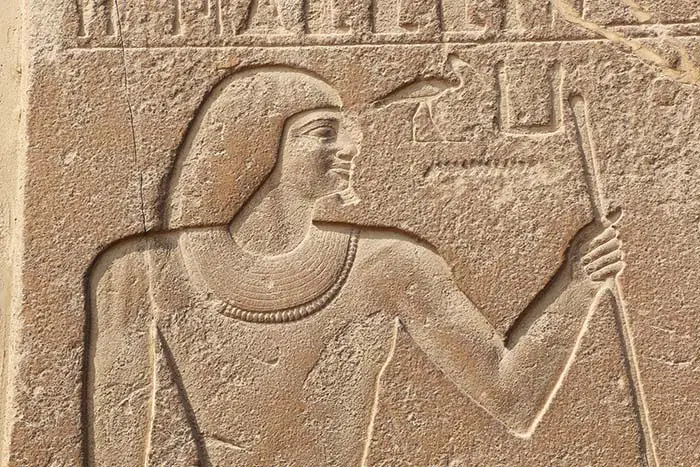
© Terry Feuerborn - Relief of Vizier Kagemni
Facts about the Role of Viziers in History
- Viziers in ancient Egypt served the ancient Egyptian civilization for millennia. They played a crucial role in all aspects of government and sometimes the government maintained order simply by the presence of the vizier.
- Although a prestigious role, it carried great responsibility and few were the functions in which a vizier was not involved.
- Ancient Egyptian viziers needed to be extremely intelligent, very knowledgeable and well educated, and of the highest moral character.
- They needed to be dedicated to serving others, humble, and to always have the best interests of their country at the forefront of their decisions.
Bibliography
- A History of Ancient Egypt. Blackwell, 1992
- Judgement of the Pharaoh : crime and punishment in ancient Egypt
